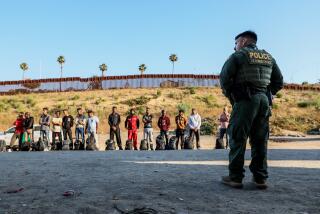Should noncitizens be protected from excessive force at border? Supreme Court to consider case
Reporting from WASHINGTON — The Supreme Court will consider Friday whether the family of a Mexican teenager shot and killed just across the border can sue the U.S. Border Patrol agent who pulled the trigger.
If the justices agree to hear the family’s appeal, they ultimately could decide whether U.S. constitutional protections against unreasonable force stop at the U.S. border or extend to noncitizens on foreign soil controlled by U.S. authorities.
Border agents have shot across the border and killed at least eight Mexicans since 2006, records show. So far, lawsuits filed in U.S. courts by their families against the agents or the government have gone nowhere because the victims were noncitizens on foreign territory.
The cases have sparked outrage in Mexico and among advocacy groups, and are cited to bolster accusations that the Border Patrol wields deadly force without accountability.
Border Patrol agents have argued that lethal force against people throwing rocks is justified because rocks can be deadly. But the agency changed its policy last year to restrict the practice and encourage agents to move out of range of thrown projectiles if possible.
The Supreme Court case focuses on Sergio Adrian Hernandez Guereca, 15, who was shot in the face in June 2010 as he stood on the Mexican side of a riverbed dividing El Paso, Texas, from Juarez, Mexico.
Border Patrol Agent Jesus Mesa Jr. told investigators he shot in self-defense after teenagers threw rocks at him. The FBI cleared him of wrongdoing.
Witnesses said the teen and his friends were playing a game by running up the riverbed’s concrete culvert and touching the border fence, then running back into Mexico.
Mesa claimed that after he grabbed one youth, the others pelted him with rocks. He fired at least twice at Hernandez Guereca.
“One round struck subject under left eye, subject expired on scene,” the Border Patrol’s use-of-force report said after the incident.
U.S. authorities previously had arrested Hernandez Guereca twice for smuggling people across the border, but released him back to Mexico because he was a juvenile.
In a brief, Mesa’s lawyers wrote he could have “reasonably assumed … that Hernandez was breaking the law as an alien smuggler.”
Robert Hilliard, a Corpus Christi, Texas, attorney who represents the youth’s family, said in court papers that there is currently “a law-free zone in which U.S. agents can kill innocent citizens with impunity.”
He urged the Supreme Court to let victims’ families plead their cases in U.S. courts. “Innocent Mexican nationals have been murdered with no ability to speak through the court system to the person who committed a crime,” he said in an interview.
The family’s initial attempt to sue Mesa was dismissed by a federal judge, who ruled they could not sue a U.S. agent for shooting a Mexican teenager on the Mexican side of the border.
The U.S. 5th Circuit Court of Appeals briefly revived the claim with a 2-1 decision, citing cases involving terrorism suspects held at the military prison in Guantanamo Bay, Cuba. Like the naval station, the panel said, the border area where the shooting occurred is under U.S. control.
In April, however, the full appeals court sitting in New Orleans threw out the suit. Because the teenager “was on Mexican soil at the time he was shot,” the court found, he was not protected by the U.S. Constitution.
The judges also said that because the law was not clear, Mesa was immune from being sued.
Josiah Heyman, director of the Center for Inter-American and Border Studies at the University of Texas at El Paso, says the Supreme Court needs to sort out the law. As it stands now, courts cannot even consider whether a shooting was justified.
“It is as if the bullet disappears from legal accountability when it crosses the border, which is a very strange idea,” Heyman said in a telephone interview. “We have to decide: Is there any accountability at all?”
Border Patrol union leaders, concerned about violence on the border, say such lawsuits could make agents hesitate to carry out their duties.
“Just like all of the attacks on law enforcement officers, it makes agents think twice about doing their job,” Shawn Moran, a spokesman for the National Border Patrol Council union representing most Border Patrol agents, said in a telephone interview from San Diego. “It could make them hesitate when it really matters — they might be thinking about the repercussions.”
Only one Border Patrol agent has faced criminal charges for a cross-border shooting.
In September, federal authorities in Tucson charged Lonnie Swartz with second-degree murder after he was accused of killing 16-year-old Jose Antonio Elena Rodriguez by shooting through a border fence in Nogales, Ariz., on Oct. 10, 2012. The youth was hit eight times.
Swartz has pleaded not guilty. He also faces a federal civil rights lawsuit.
The Border Patrol has said Elena Rodriguez was among a group of rock-throwers endangering agents’ lives. The youth’s family said he was walking home from a basketball game with friends and wasn’t armed or throwing rocks.
More to Read
Sign up for Essential California
The most important California stories and recommendations in your inbox every morning.
You may occasionally receive promotional content from the Los Angeles Times.













